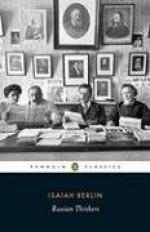
|
| Name: _________________________ | Period: ___________________ |
This test consists of 15 multiple choice questions and 5 short answer questions.
Multiple Choice Questions
1. What qualities did the characters based on Belinsky possess?
(a) Diabolical political stances.
(b) Dreamy romanticism.
(c) Nihilistic recklessness.
(d) Awkward earnestness.
2. What group was Herzen part of in university?
(a) Herzen was one of Turgenev's "superfluous men."
(b) Herzen was part of the Petrachevsky circle.
(c) Herzen was one of Belinsky's proteges.
(d) Herzen belonged to a group of student radicals.
3. According to Berlin, why is there not a good biography of Alexander Herzen?
(a) Because Herzen's biographers were censored by the government.
(b) Because Herzen destroyed all of his papers.
(c) Because Herzen's papers were all lost in a fire.
(d) Because Herzen's autobiography is so remarkable.
4. What allowed the leader of the Populists to lead?
(a) He was born to an aristocratic father and a poor mother, so he understood both worlds.
(b) He was born in Europe, so he could see Russian culture without bias.
(c) He was born after the period of repression, so he experienced a full spectrum of Russian literature and life.
(d) He was born to a parish priest, so he understood poor people's concerns.
5. How was Turgenev received by the radicals of the 1860s and 70s?
(a) He was dismissed as a noble.
(b) He was rejected as ineffectual.
(c) He was embraced as a model.
(d) He was celebrated as a visionary.
6. Whose writings were populists influenced by?
(a) Dostoevsky.
(b) Gogol.
(c) Belinsky.
(d) Herzen.
7. What was Tolstoy's opinion about his professors?
(a) Tolstoy believed that they were fostering a revolutionary consciousness in their students.
(b) Tolstoy believed that they contained the wealth of the world between themselves collectively.
(c) Tolstoy believed that they wasted their time on trivialities.
(d) Tolstoy believed that they were undermining the aristocracy.
8. How did Herzen manifest the values he shared with his circle?
(a) Herzen moved to Europe to write.
(b) Herzen wrote anti-Tsarist propaganda.
(c) Herzen founded a revolutionary syndicate.
(d) Herzen drank and gambled, and dabbled in tales that described his exploits.
9. What did the character Bazarov represent?
(a) Destructive criticism and nihilism.
(b) The traditional aristocrat.
(c) Anarchy and violence.
(d) The coming Russian Revolution.
10. What did Herzen understand that the revolutionaries did not understand?
(a) The corrupting nature of power.
(b) The cost of revolutionary change.
(c) The hellish nature of armed conflict.
(d) The power of the aristocracy.
11. What does the Russian word "obshcnina" mean?
(a) Peasant communes.
(b) Aristocratic privileges.
(c) Russian territories.
(d) Inherited customs.
12. How widely was Belinsky read?
(a) Belinsky was known primarily in Europe.
(b) Belinsky was only known in small circles of Petersburg intelligentsia.
(c) Belinsky was read even in the Russian provinces.
(d) Belinsky was only known in small circles of Moscow intelligentsia.
13. What was Herzen anxious to avoid becoming?
(a) A political prisoner.
(b) A husband.
(c) An over-educated dilettante.
(d) A bureaucrat.
14. Which principles did Belinsky never abandon?
(a) German Romanticism.
(b) Russian Nationalism.
(c) English Humanism.
(d) French Decadence.
15. What balance did Herzen strike in his philosophy?
(a) A balance between political engagement and artistic remove.
(b) A balance between revolutionary activities and aristocratic manners.
(c) A balance between social justice and intellectual skepticism.
(d) A balance between living naturally and making art.
Short Answer Questions
1. What model did populists see as the basis for reform?
2. What interaction did Tolstoy have with the radical Dobrolyubov?
3. When did Vissarion Belinsky die?
4. What native influence affected the Russian Populists?
5. Which two thinkers influenced the Russian populists?
|
This section contains 577 words (approx. 2 pages at 300 words per page) |

|




